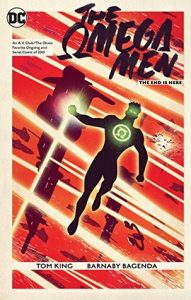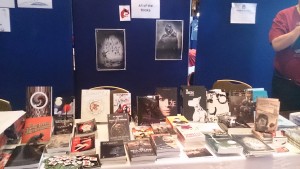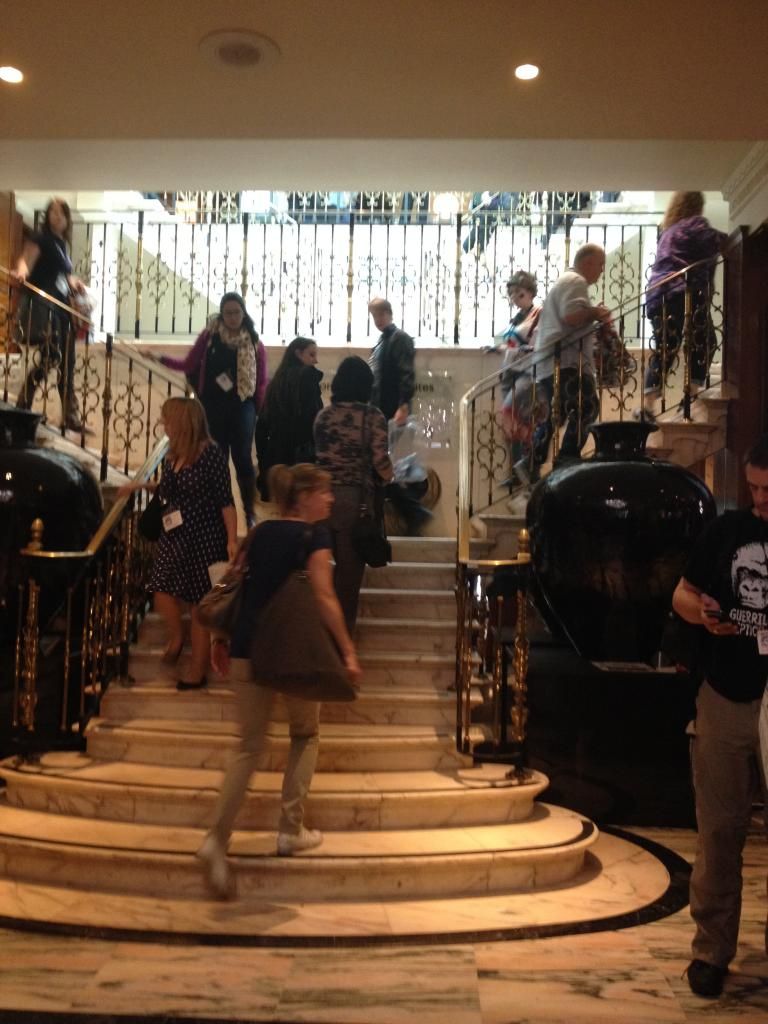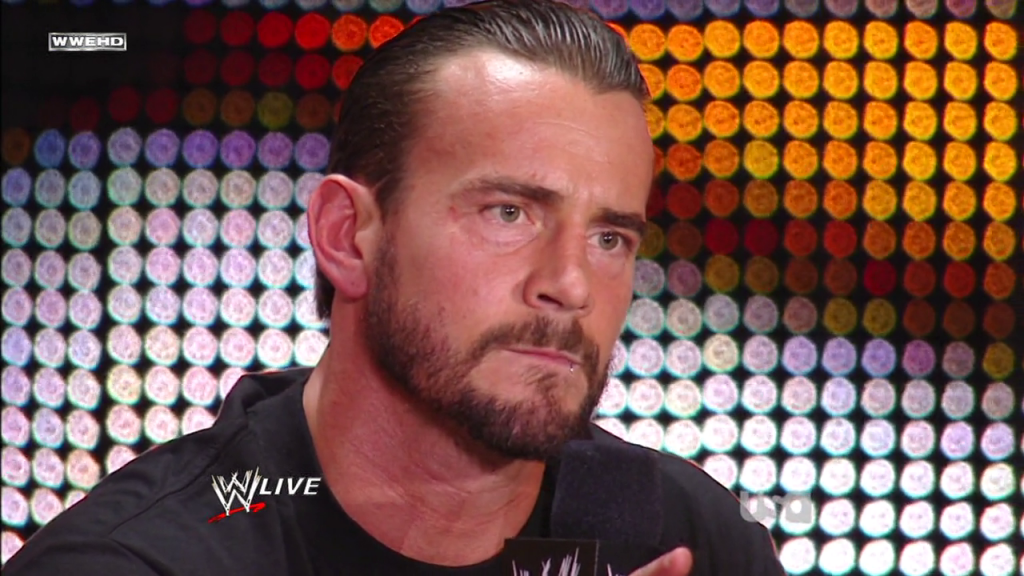Special thanks this month to Den Patrick and James Smythe, who helped shape the central idea in this column. Go buy their books, they’re ace.![]()
Convention season is (mostly) over for me for the year. I’m incredibly lucky in that my job takes me to shows like WorldCon (Which was in Kansas City or, as I like to call it, the Beef Singularity), EdgeLit, Nine Worlds and FantasyCon. Being able to see how both sides of the Atlantic, and every scale of show, do things is a really interesting experience. Especially as there’s one thing none of those shows managed to do;
Got out of their panelist’s way.
I’m not slamming the organizers here. I’ve worked that side of the fence, I know how hard and how utterly thankless a task it is. What I am criticizing is the culture they’re having to work inside, one inherited from decades of calcifiied and at times no longer relevant experience. Experience that actively stops authors doing their jobs.
Here’s an example, which demonstrates both how conventions and authors need to change; Fantasycon 2009/10, I sat in the audience for that year’s ‘YA? To Be Viewed With Fear? Or Merely Suspicion?‘ Panel. One of the panelists was an American author whose debut novel had just come out. He had a copy with him and, inevitably, referenced it a lot during the panel. Not only is this fine, but he also managed to make a running gag out of it.
Given that other panel members were snarktweeting about him as the panel was happening, I’m guessing it didn’t go down as well with them as it did with me.
I’ve thought about that day a lot recently. It was a miserable convention as everything I attended from that particular era of the BFS was, but that’s not why it’s been playing on my mind. Rather, it’s been coming up a lot more because I’ve now seen four conventions in a row where authors haven’t just not promoted their work, they’ve blithely accepted that they shouldn’t really have to. There’s a feeling, and I’ve heard a real human say this, with words, in the 21st century, that it should be the publishers’ job.
In an ideal world, yeah it probably should.
Take a look outside.
There was a clown out there wearing a DRUMPF 2016 t-shirt and crying about Harambe wasn’t there?
Thought so.
Ugly Truth time. Authors have to promote their own work right now. You just do. You can complain about it all you want but every time you don’t bother promoting your work, fifteen other people are promoting their’s. You can turn in the best work you’ve ever done, you can actually write the Great American Novel or the next Girl With A Pearl Earring Tattoo On The Train and I PROMISE you absolutely no one will give shit one unless you tell people about it.
Feel awkward? Feel like it’s not good enough? Feel like you’re bothering people?
Good.
In order:
1) Suck it up, you’re a ghost buster.
2) Everyone feels that way about everything ever.
3) YOU ARE NOT BOTHERING PEOPLE.
Seriously the moment you hit that unease, stay there because you’re probably talking about your stuff just the right amount. Case in point; we interact with kickstarter campaigns three times before we decide whether or not to pledge. In order to do that we need to be reminded that the campaign exists twice. Same goes for every form of retail interaction ever. So, you need to be talking about your work at least three times during the lifetime of a project. And by ‘lifetime’ I mean three times a day until your next project comes out.
A quick aside; it is absolutely possible to over promote. Automated DMs on twitter and using 3-35 hashtags in a tweet are really good ways to over promote and annoy people. Don’t do those. Instead do what works for you and what makes you feel just a little frightened. That fear is your friend. Shows you’re pushing yourself.
 So that’s ‘Should authors self-promote?’ Answered. And oddly without using the word YES in 72 point block capitals. This time.
So that’s ‘Should authors self-promote?’ Answered. And oddly without using the word YES in 72 point block capitals. This time.
Now, conventions!
For some reason, the panel format has become both the default and a blanket to smother authors’ own priorities beneath. It’s not intentional and is clearly one of those dusty pieces of ancestral wisdom that’s been around so long none of us can tell whether or not it’s bad because it’s what we’ve always done.
Here’s the thing; it’s really bad and, crucially, unfair.
We need to stop doing it. Here’s how.
Encourage authors to talk about their books on the panel. If they want copies up there, so much the better! These are people who, odds are, have paid hundreds of pounds to attend the event and who are so conditioned by the industry wide inferiority complex we labor under that they’re not going to promote their work without being told they’re allowed.
TELL THEM THEY’RE ALLOWED.
Be prepared for some of them to hug you when you do.
Mix the format up a little bit. Here are a few ideas:
Podcast Everything
A few years ago, our esteemed leader at Fox Spirit very successfully ran a podcast track of every single panel at Fantasycon and Alt Fiction. The fact this has never been followed up on mystifies me. Yes you need to get releases from people but that’s the sort of legal boilerplate that takes very little research. From a technical point of view you can go old school and just record panels with a voice memo app and a smartphone from the desk the panelists are sitting behind. Feeling fancy? Talk to the hotel about using the built in audio system, get a mixer, and you’re away. None of this stuff is hard, it’s just new. And if you do decide to do this? Please get in touch. If we can’t help, then we know podcasters who can.
Magazine Showcases
Panels are fine but there are lots of other ways you can present guests. MidAmericon II did really interesting work with Magazine Showcases this year. They had each publication attending (Or publisher in my company, Escape Artists’, case) present a panel featuring some of their authors and staff. I attended all these panels and it was a brilliant way to cover a lot of ground, and a lot of authors, in a small space of time.
TED Talks!
Or perhaps TOD talks just in case their lawyers are present! I tried this on the Comics track at Nine Worlds this year and it worked really well. Extended, 10-15 minute presentations by individual authors on something close to their heart and related to their work. We were able to get Paul Cornell and Laurie Penny in to talk about the history and symbology of UFO incidents and John Constantine respectively and it was great. Both subjects were tied back to their own work, both went far more in depth normal and the twin needs of self-promotion and added information value for the convention were met brilliantly.
Kill The Trade Hall, Save The Trade Hall
Nine Worlds’ Expo and MidAmericon II’s shopping section were the only two conventions this year I’ve seen do retail close to right. Far too often, publishers’ and booksellers’ tables are crammed away in a corner or, worse still, split across multiple locations. Don’t do that. Instead, do this:
-Put a book table in every room you have book events. Make sure they have a cash float or if you’re feeling fancy, electronic sales facilities. If you aren’t feeling fancy? A cash float of 50 to 70 pounds and a hand written receipt ledger will sort you out. You have a volunteer in there anyway so give them something to do other than hold up a 5 MINUTES LEFT sign.
-Pre load the table, that morning, with stock written by every author who will be in the room that day.
-As each new panel begins, load the table with books by the new set of panelists.
-At the end of the panel, use the 15 minute inter-room shuffle to give people a chance to buy books by the folks they’ve just spent an hour listening to.
Every single author in that room over the course of your show will sell books. Every single trader will thank you for putting their work directly in front of interested authors. You will be lauded as brilliant, maverick innovators in a field that still sometimes sighs nostalgically about the terrible hotels it decided it deserved in the early ’00s. This is a universally good thing, a moment of Ecclestonian joy
Look at him! Look at his little pointy face! You could elicit that joy in authors, publishers and convention goers! All you have to do is try something new and when it works, which it will, other people will follow your example. Then? We can finally start making panels a way of building the future instead of endless cover versions of the past.












